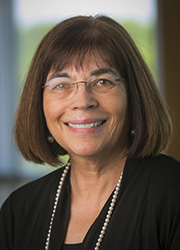No easy path, Mailick eager to take on one of university’s toughest jobs
If Marsha Mailick is at all intimidated by the prospect of taking on one of the hardest jobs on the UW–Madison campus, there is no hint of it in her demeanor, as she navigates the familiar territory of Bascom Hall.
Instead, Mailick is all business, anxious to hit the ground running, get her team in place and accelerate the momentum of thirteen years of steady leadership conferred by her predecessor, Martin Cadwallader. This week, Mailick assumes the role of interim vice chancellor for research and graduate education in the newly restructured research and graduate education environment on the UW–Madison campus.

Marsha Mailick
By any measure, the job is daunting. The big picture is overseeing a vigorous research program with 17 large interdisciplinary research centers, a research portfolio of more than $1.2 billion, and an annual budget of nearly $160 million. The challenge is to implement the structure of the new Office of the Vice Chancellor for Research and Graduate Education and weave a seamless operational fabric between that new entity and the Graduate School, which will now focus exclusively on the needs and aspirations of 9,400 graduate students in nearly 150 fields of study.
“We’ve had an intensive, five-year dialog about how to optimize the structure for this part of the university,” Mailick says. “There are many options about how to make that come alive and the exciting thing about the next year will be working with the campus community, governance groups, and research and graduate education staff to evaluate those options. This is an inflection point in the history of our university.”
Mailick is quick to emphasize that while a new structure is in place, the acts of research and graduate education remain inseparable. Graduate students, she acknowledges, are the drivers and vehicle for almost all of UW–Madison’s research programs.
The out-of-the-gate, high-level goals Mailick has set for her team include: nurturing excellence in scholarship; fostering the vitality and optimization of the campus research environment; enabling collaboration to generate creative solutions and advance the Wisconsin Idea; ensuring the responsible conduct of research; being creative in support of the process by which increasingly complex grant applications are generated; reducing administrative burden for researchers; and continuing the high level of integration between research and graduate education.
Mailick is quick to emphasize that while a new structure is in place, the acts of research and graduate education remain inseparable.
Mailick also hopes to continue and strengthen the university’s “historic partnership with the Wisconsin Alumni Research Foundation.” And she sees new opportunities to advance Wisconsin’s research and graduate education agenda through the university’s new office in Washington, D.C. and its proximity to the federal agencies that are critical in support of UW–Madison scholarship.
In many respects, Mailick is supremely prepared for the challenges ahead. A graduate of UW–Madison and Brandeis University, she is a veteran faculty member and professor in the School of Social Work and the Department of Pediatrics. She joined the faculty here in 1988 and has led the Waisman Center with distinction for the past 12 years.
A large, dynamic multidisciplinary research center, Waisman is a microcosm of UW–Madison’s overall research environment. It includes scholars, educators and clinicians from a wide variety of disciplines and experienced a sharp increase in scholarly activity during her tenure. The center includes more than 50 laboratories for basic clinical and biomedical and behavioral research. It also includes a brain imaging center, a clinical biomanufacturing facility, specialty clinics and even a school for young children with and without intellectual disabilities.
Mailick has a granular familiarity with UW–Madison research administration and the people who populate it.
The Waisman Center is also one of the major interdisciplinary centers long in the orbit of the Graduate School, so Mailick has a granular familiarity with UW–Madison research administration and the people who populate it.
“The reason I came to Wisconsin was so I could carry out my research program in an interdisciplinary center like Waisman,” notes Mailick, an expert on the families of people with neurodevelopmental disorders. The chance to lead UW–Madison’s program of research and graduate education, she adds, “is a unique opportunity to nurture scholarship across all divisions, especially scholarship that brings diverse methods and perspectives together.”
In her new role, Mailick will seek to build on an extraordinary track record of success in research and graduate education. “Implementing the new structure will be a creative act,” she explains, “but the day-to-day business of our university needs to continue as we plan for the future and continued success in our research and graduate education programs.”




